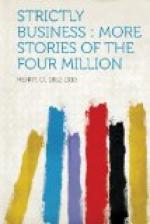“Monty,” says I, when Silver had slacked, up, “you may have Manhattan correctly discriminated in your perorative, but I doubt it. I’ve only been in town two hours, but it don’t dawn upon me that it’s ours with a cherry in it. There ain’t enough rus in urbe about it to suit me. I’d be a good deal much better satisfied if the citizens had a straw or more in their hair, and run more to velveteen vests and buckeye watch charms. They don’t look easy to me.”
“You’ve got it, Billy,” says Silver. “All emigrants have it. New York’s bigger than Little Rock or Europe, and it frightens a foreigner. You’ll be all right. I tell you I feel like slapping the people here because they don’t send me all their money in laundry baskets, with germicide sprinkled over it. I hate to go down on the street to get it. Who wears the diamonds in this town? Why, Winnie, the Wiretapper’s wife, and Bella, the Buncosteerer’s bride. New Yorkers can be worked easier than a blue rose on a tidy. The only thing that bothers me is I know I’ll break the cigars in my vest pocket when I get my clothes all full of twenties.”
“I hope you are right, Monty,” says I; “but I wish all the same I had been satisfied with a small business in Little Rock. The crop of farmers is never so short out there but what you can get a few of ’em to sign a petition for a new post office that you can discount for $200 at the county bank. The people here appear to possess instincts of self-preservation and illiberality. I fear me that we are not cultured enough to tackle this game.”
“Don’t worry,” says Silver. “I’ve got this Jayville-near-Tarrytown correctly estimated as sure as North River is the Hudson and East River ain’t a river. Why, there are people living in four blocks of Broadway who never saw any kind of a building except a skyscraper in their lives! A good, live hustling Western man ought to get conspicuous enough here inside of three months to incur either Jerome’s clemency or Lawson’s displeasure.”
“Hyperbole aside,” says I, “do you know of any immediate system of buncoing the community out of a dollar or two except by applying to the Salvation Army or having a fit on Miss Helen Gould’s doorsteps?”
“Dozens of ’em,” says Silver. “How much capital have you got, Billy?”
“A thousand,” I told him.
“I’ve got $1,200,” says he. “We’ll pool and do a big piece of business. There’s so many ways we can make a million that I don’t know how to begin.”
The next morning Silver meets me at the hotel and he is all sonorous and stirred with a kind of silent joy.
“We’re to meet J. P. Morgan this afternoon,” says he. “A man I know in the hotel wants to introduce us. He’s a friend of his. He says he likes to meet people from the West.”
“That sounds nice and plausible,” says I. “I’d like to know Mr. Morgan.”
“It won’t hurt us a bit,” says Silver, “to get acquainted with a few finance kings. I kind of like the social way New York has with strangers.”




